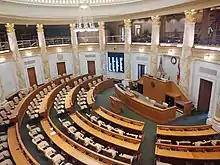Arkansas House of Representatives
The Arkansas House of Representatives is the lower house of the Arkansas General Assembly, the state legislature of the US state of Arkansas. The House is composed of 100 members elected from an equal amount of constituencies across the state. Each district has an average population of 29,159 according to the 2010 federal census. Members are elected to two-year terms and, since the 2014 Amendment to the Arkansas Constitution, limited to sixteen years cumulative in either house.[1]
Arkansas House of Representatives | |
|---|---|
| 93rd Arkansas General Assembly | |
 Seal | |
| Type | |
| Type | |
Term limits | 16 Years (both houses) |
| History | |
| Founded | January 30, 1836 |
New session started | January 11, 2021 |
| Leadership | |
Speaker of the House | |
Speaker pro Tempore | Jon Eubanks (R) since January 2015 |
Majority Leader | |
Minority Leader | |
| Structure | |
| Seats | 100 |
 | |
Political groups | Majority
Minority |
Length of term | 2 years |
| Authority | Article 8, Section 2, Arkansas Constitution |
| Salary | $39,399.84/year + per diem |
| Elections | |
| First-past-the-post | |
Last election | November 3, 2020 (100 seats) |
Next election | November 8, 2022 (100 seats) |
| Redistricting | Arkansas Board of Apportionment |
| Meeting place | |
 | |
| House of Representatives Chamber Arkansas State Capitol Little Rock, Arkansas | |
| Website | |
| Arkansas House of Representatives | |
The Arkansas House of Representatives meets annually, in regular session in odd number years and for a fiscal session in even number years, at the State Capitol in Little Rock.[2]
Leadership of the House
The Speaker of the House presides over the body and is elected by the membership every two years. Its duties include the supervision and directing the daily order of business, recognizing members to speak, preserving order in the House, deciding all questions of order and germaneness, certifying all measures passed, assigning committee leadership, and naming members to select committees. In the Speaker's absence, the Speaker Pro Tempore presides.
Leadership information
| Position | Name | Party | County | District | |
|---|---|---|---|---|---|
| Speaker of the House | Matthew Shepherd | Republican | Union | 6 | |
| Speaker pro tempore | Jon Eubanks | Republican | Logan/Franklin/Scott/Sebastian | 74 | |
Current composition

| 76 | 24 |
| Republican | Democratic |
| Affiliation | Party (Shading indicates majority caucus) |
Total | ||||
|---|---|---|---|---|---|---|
| Republican | Democratic | Ind | Green | Vacant | ||
| End of the 90th General Assembly | 68 | 31 | 1 | 0 | 100 | 0 |
| Beginning of the 91st General Assembly | 76 | 24 | 0 | 0 | 100 | 0 |
| Current | 76 | 24 | 0 | 0 | 100 | 0 |
| Latest voting share | 76% | 24% | ||||
Current membership
| District | Name | Party | First elected | Term-limited |
|---|---|---|---|---|
| 1 | Carol Dalby | Rep | 2016 | 2032 |
| 2 | Lane Jean | Rep | 2010 | 2026 |
| 3 | Danny Watson | Rep | 2016 | 2032 |
| 4 | DeAnn Vaught | Rep | 2014 | 2030 |
| 5 | David Fielding | Dem | 2010 | 2026 |
| 6 | Matthew Shepherd | Rep | 2010 | 2026 |
| 7 | Sonia Eubanks Barker | Rep | 2016 | 2032 |
| 8 | Jeff Wardlaw | Rep | 2010 | 2026 |
| 9 | Howard Beaty | Rep | 2020 | 2036 |
| 10 | Mike Holcomb | Rep | 2012 | 2028 |
| 11 | Mark McElroy | Rep | 2012 | 2030 |
| 12 | David Tollett | Rep | 2020 | 2036 |
| 13 | David Hillman | Rep | 2012 | 2028 |
| 14 | Roger Lynch | Rep | 2016 | 2032 |
| 15 | Ken Bragg | Rep | 2012 | 2028 |
| 16 | Ken Ferguson | Dem | 2014 | 2030 |
| 17 | Vivian Flowers | Dem | 2014 | 2030 |
| 18 | Richard Womack | Rep | 2012 | 2028 |
| 19 | Justin Gonzales | Rep | 2014 | 2030 |
| 20 | John Maddox | Rep | 2016 | 2032 |
| 21 | Marcus Richmond | Rep | 2014 | 2030 |
| 22 | Richard McGrew | Rep | 2020 (special) | 2036 |
| 23 | Lanny Fite | Rep | 2014 | 2030 |
| 24 | Bruce Cozart | Rep | 2011† | 2028 |
| 25 | Les Warren | Rep | 2016 | 2032 |
| 26 | Rick McClure | Rep | 2020 | 2036 |
| 27 | Julie Mayberry | Rep | 2016 | 2032 |
| 28 | Tony Furman | Rep | 2020 | 2036 |
| 29 | Fredrick Love | Dem | 2010 | 2026 |
| 30 | Fred Allen | Dem | 2016 | 2032 |
| 31 | Keith Brooks | Rep | 2020 | 2036 |
| 32 | Ashley Hudson | Dem | 2020 | 2036 |
| 33 | Tippi McCullough | Dem | 2018 | 2034 |
| 34 | Joy Springer | Dem | 2020 (special) | 2036 |
| 35 | Andrew Collins | Dem | 2018 | 2034 |
| 36 | Denise Ennett | Dem | 2019 (special) | 2034 |
| 37 | Jamie Aleshia Scott | Dem | 2018 | 2028 |
| 38 | Carlton Wing | Rep | 2016 | 2032 |
| 39 | Mark Lowery | Rep | 2012 | 2028 |
| 40 | David Ray | Rep | 2020 | 2036 |
| 41 | Karilyn Brown | Rep | 2014 | 2030 |
| 42 | Mark Perry | Dem | 2018 | 2034 |
| 43 | Brian S. Evans | Rep | 2018 | 2034 |
| 44 | Cameron Cooper | Rep | 2018 | 2034 |
| 45 | Jim Wooten | Rep | 2018 | 2034 |
| 46 | Les Eaves | Rep | 2014 | 2030 |
| 47 | Craig Christiansen | Rep | 2018 | 2034 |
| 48 | Reginald Murdock | Dem | 2010 | 2026 |
| 49 | Steve Hollowell | Rep | 2016 | 2032 |
| 50 | Milton Nicks | Dem | 2014 | 2030 |
| 51 | Deborah Ferguson | Dem | 2012 | 2028 |
| 52 | Dwight Tosh | Rep | 2014 | 2030 |
| 53 | Jon Milligan | Rep | 2020 | 2036 |
| 54 | Johnny Rye | Rep | 2016 | 2032 |
| 55 | Monte Hodges | Dem | 2012 | 2028 |
| 56 | Joe Jett | Rep | 2012 | 2028 |
| 57 | Jimmy Gazaway | Rep | 2016 | 2032 |
| 58 | Brandt Smith | Rep | 2014 | 2030 |
| 59 | Jack Ladyman | Rep | 2014 | 2030 |
| 60 | Frances Cavenaugh | Rep | 2016 | 2032 |
| 61 | Marsh Davis | Rep | 2018 | 2034 |
| 62 | Michelle Gray | Rep | 2014 | 2030 |
| 63 | Stu Smith | Rep | 2018 | 2034 |
| 64 | John Payton | Rep | 2012 | 2028 |
| 65 | Rick Beck | Rep | 2014 | 2030 |
| 66 | Josh Miller | Rep | 2012 | 2028 |
| 67 | Stephen Meeks | Rep | 2010 | 2026 |
| 68 | Stan Berry | Rep | 2018 | 2034 |
| 69 | Aaron Pilkington | Rep | 2016 | 2032 |
| 70 | Spencer Hawks | Rep | 2018 | 2034 |
| 71 | Joe Cloud | Rep | 2018 | 2034 |
| 72 | Stephen Magie | Dem | 2012 | 2028 |
| 73 | Mary Bentley | Rep | 2014 | 2030 |
| 74 | Jon Eubanks | Rep | 2012 | 2028 |
| 75 | Lee Johnson | Rep | 2018 | 2034 |
| 76 | Cindy Crawford | Rep | 2018 | 2034 |
| 77 | Justin Boyd | Rep | 2014 | 2030 |
| 78 | Jay Richardson | Dem | 2018 | 2034 |
| 79 | Gary Deffenbaugh | Rep | 2010 | 2026 |
| 80 | Charlene Fite | Rep | 2012 | 2028 |
| 81 | Bruce Coleman | Rep | 2016 | 2032 |
| 82 | Mark H. Berry | Rep | 2020 | 2036 |
| 83 | Keith Slape | Rep | 2018 | 2034 |
| 84 | Denise Garner | Dem | 2018 | 2034 |
| 85 | David Whitaker | Dem | 2012 | 2028 |
| 86 | Nicole Clowney | Dem | 2018 | 2034 |
| 87 | Robin Lundstrum | Rep | 2014 | 2030 |
| 88 | Clint Penzo | Rep | 2016 | 2032 |
| 89 | Megan Godfrey | Dem | 2018 | 2034 |
| 90 | Kendon Underwood | Rep | 2020 | 2036 |
| 91 | Delia Haak Delia J. Haak | Rep | 2020 | 2036 |
| 92 | Gayla Hendren McKenzie | Rep | 2018 | 2034 |
| 93 | Jim Dotson | Rep | 2012 | 2028 |
| 94 | John P. Carr | Rep | 2014 | 2030 |
| 95 | Austin McCollum | Rep | 2016 | 2032 |
| 96 | Joshua P. Bryant | Rep | 2020 | 2036 |
| 97 | Harlan Breaux | Rep | 2018 | 2034 |
| 98 | Ron McNair | Rep | 2014 | 2030 |
| 99 | Jack Fortner | Rep | 2016 | 2032 |
| 100 | Nelda Speaks | Rep | 2014 | 2030 |
Past composition of the House of Representatives
Committees
The House has 10 Standing Committees:
CLASS A
- Education
- Judiciary
- Public Health, Welfare & Labor
- Public Transportation
- Revenue and Taxation
CLASS B
- Aging, Children & Youth, Legislative & Military Affairs
- Agriculture, Forestry & Economic Development
- City, County and Local Affairs
- Insurance and Commerce
- State Agencies and Governmental Affairs
HOUSE SELECT COMMITTEES
- Rules
- House Management
JOINT COMMITTEES
- Budget
- Energy
- Performance Review
- Public Retirement and Social Security Programs
- Advanced Communication and Information Technology
CURRENT COMMITTEES INCLUDE:[3]
|
|
Each Representative serves on two Standing Committees, and each committee has 20 members. Standing Committee chairmen and vice-chairmen are selected from respective committee rosters by the Speaker.
Two Select Committees operate exclusively within the House. Members of the committees are appointed by the Speaker. The House Select Committees are the House Committee on Rules and the House Management Committee.
The Committee on Rules considers all proposed action touching the House rules, the joint rules and the order of business. The Committee also considers all legislation dealing with alcohol, cigarettes, tobacco, tobacco products, coin-operated amusement devices, vending machines, lobbying, code of ethics, pari-mutuel betting and similar legislation.
The House Management Committee works with the Speaker of the House to direct and oversee operations of the House of Representatives. Its duties include the hiring and supervision of the House Staff, the development of personnel policies and procedures, and the monitoring of facility usage and maintenance.
Representatives also serve on five committees that operate jointly with the Senate. They are Joint Budget, Joint Retirement and Social Security Programs, Joint Energy, Joint Performance Review and Joint Committee on Advanced, Communications and Information Technology
House members of the Joint Budget Committee are chosen by their peers from respective caucus districts. House members on other Joint Committees are appointed to their positions by the Speaker.
History
John Wilson, the speaker of the Arkansas House of Representatives, stabbed Representative J. J. Anthony to death during a legislative debate on the floor of the chamber in 1837. Wilson was later acquitted. The Old State House is said to be haunted to this day.[4][5]
In 1922, Frances Hunt became the first woman elected to a seat in the Arkansas General Assembly when she was elected to a seat in the Arkansas House of Representatives.[6]
In 2020, several members tested positive for the COVID-19 during the COVID-19 pandemic in Arkansas.[7]
References
- "Home - Arkansas House of Representatives". www.arkansashouse.org. Retrieved February 19, 2019.
- "Arkansas House of Representatives". Ballotpedia. Retrieved February 19, 2019.
- "Arkansas House Committees". Open States. Sunlight Foundation. April 9, 2014. Retrieved April 9, 2014.
- Archived September 27, 2011, at the Wayback Machine
- "Archived copy". Archived from the original on May 11, 2018. Retrieved May 11, 2018.CS1 maint: archived copy as title (link)
- "Women". The Encyclopedia of Arkansas History & Culture. Arkansas: The Central Arkansas Library System. 2010. Retrieved March 31, 2010.
- Shepherd, Matthew J. (October 20, 2020). "Two House Members Test Positive for COVID-19. Legislative Meetings Postponed". Arkansas House of Representatives. Retrieved October 20, 2020.
External links
| Wikimedia Commons has media related to Arkansas House of Representatives. |